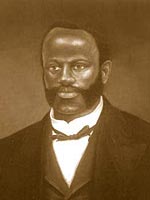FEB 3RD 1870 Jonathan Jasper Wright is appointed the first Black Superior Court Justice in South Carolina

Jonathan Jasper Wright was born February 11, 1840, in Luzerne County, the son of runaway slaves who came north aided by the Underground Railroad and grew up in Springville. He was privately tutored and mentored by Springville’s Dr. William Wells Pride, who was active in the anti-slavery movement.
Educated in common schools of Pennsylvania and Lancasterian Academy, Ithaca, NY, he read law at the Bentley, Fitch, Bentley law office in Montrose, while supporting himself as a teacher. He later read law in the chambers of Wilkes-Barre Judge O. Collins and taught school in Wilkes-Barre. He attempted to stand for the Pennsylvania Bar, but was denied the opportunity because of his race. After the passage of the Civil Rights Bill in 1866, Jonathan returned to Pennsylvania and petitioned authorities to allow him to take the bar examination. His request was granted, and he was admitted to the Pennsylvania Bar on August 13, 1866, making him the first black man licensed to practice law in Pennsylvania.
He joined the American Missionary Association, a legendary, abolitionist group and moved to Beaufort, South Carolina in 1865 to teach the newly freed slaves. He also became the legal advisor to General Oliver O. Howard, for the Freedman’s Bureau. Wright viewed his responsibility as one "to vindicate the cause of the downtrodden," and he quickly acquired a following among the newly freed slaves. These activities drew criticism from some in Beaufort. Wright answered by saying, “Had I been content to settle down and been what the masses of white persons desired of me (a bootblack, a barber, or a hotel waiter), I would have been heard of less.” He was a delegate to the Colored People’s Convention in Charleston and was elected to the Union Republican Party’s state central committee, upon which he served as a delegate to the South Carolina State Constitutional Convention in 1867.
Wright was elected to the South Carolina Senate in April, 1868, and was sworn in as a member of the South Carolina Bar on September 23, 1868, becoming one of three black lawyers to be admitted to practice law in South Carolina.
After serving as a State Senator he was appointed to the Supreme Court of South Carolina, and on February 1, 1870, Justice Wright was elected as Associate Justice of the Supreme Court of South Carolina where he served until December 1, 1877. Justice Wright authored some 90 opinions that influenced the direction of the court in South Carolina, and many of these decisions are still relied upon to this day as legal precedent. Charges were made concerning Wright’s conduct when he refused to recognize the disputed election of Wade Hampton as governor, which he said he could not do and "honor my judicial trust after Wade Hampton was elected Governor of South Carolina. Although these allegations appear to have been entirely fabricated, Wright saw that he would be forced from the Supreme Court and submitted his resignation.
Jonathan Jasper Wright set up law offices in Charleston, South Carolina, and he established the Law Department at Claflin College, where he began training law students. He served as a Claflin College trustee and was active in the Republican Party. He died on February 19, 1885 of tuberculosis. He is buried in Calvary Episcopal Church Cemetery, Charleston, South Carolina.
For many years after Justice Wright’s death from tuberculosis, his reputation was subjected to suspicion, racism, and neglect. Even official portraits of the Justice could no longer be found.
A century after his death the South Carolina Supreme Court did rectify his stature. On two occasions within the past four years, South Carolina Supreme Court justices bestowed belated honor on Justice Wright. In 1997, the justices celebrated Wright’s service to the court by unveiling a rare 1870 portrait of him that had been published in Harper’s magazine. Last year, a granite grave marker was unveiled. During that ceremony, Chief Justice Ernest Finney, Jr., stated, "[Wright's] election to the supreme court marked a high point in a celebrated career of public service, as a teacher, a lawyer, and as a statesman."
In partnership with the Pennsylvania Historical and Museum Commission, the Springville Settlers’ Historians and the Center for Anti-Slavery Studies participated in the dedication of a state historical marker on September 13, 2001 in Springville, PA. on Route 29 commemorating Justice Jonathan Jasper Wright.
Also on this Day in Black History -
1870 - The U.S. Congress passesd the 15th Amendment giving the right to vote to all male citizens, including Blacks. The American Anti-Slavery Society later disbands, thinking their work is done.
1956 - Black student, Autherine Lucy, enrolled at the University of Alabama. She is later expelled for making false and derogatory statements about the University.
1989 - Bill White, former St. Louis Cardinals first baseman, became the first Black to head the National League of an American Baseball professional sport league.

<< Home